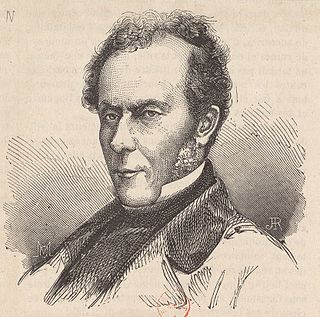
Frankétienne is a Haitian writer, poet, playwright, painter, musician, activist and intellectual. He is recognized as one of Haiti's leading writers and playwrights of both French and Haitian Creole, and is "known as the father of Haitian letters". As a painter, he is known for his colorful abstract works, often emphasizing the colors blue and red. He was a candidate for the Nobel Prize in Literature in 2009, made a Commander of the Ordre des Arts et Lettres, and was named UNESCO Artist for Peace in 2010.

Jacques Stephen Alexis was a Haitian communist novelist, poet, and activist. He is best known for his novel Compère Général Soleil (1955).

Alexis Beaubrun Ardouin (1796–1865) was a Haitian historian and politician. He wrote the eleven-volume Etudes sur l'Histoire d'Haïti, published in the 1850s and 60s. His Etudes have served as a valuable resource for later historians. Beaubrun Ardouin also wrote the first Haitian textbook, Géographie de l'Ile d'Haïti and Instruction sur le Jury. Ardouin's historical writing attempted to put the Haitian Revolution in the context of other nationalist revolutions in the Americas. He had Euro-African ancestry and his family was free before the revolution. He has been criticized by 20th-century scholars for championing free people of color as the leaders both of the revolution and of post-independence Haiti.

Louis-Joseph Janvier was a Haitian journalist, diplomat and novelist.
Léon Laleau was a Haitian writer, politician, and diplomat. Laleau is still recognized "as one of the most brilliant writers of his time". He received several international awards, such as the Edgar Allan Poe Prize in 1962. He was also a member of the Ronsard Academy, the Académie Méditerranéenne. He was recipient of numerous honors, including The Legion of Honor rank of Grand Officer (France), Saint Grégoire (Vatican), and Palms Académique, Arts et Lettres rank of Commandeur (France).
Justin Lhérisson was a Haitian writer, lawyer, journalist, and teacher. He is best known for two novels, La Famille des Pititecaille (1905) and Zoune Chez sa Ninnaine (1906), and for being the author of the lyrics of Haiti's national anthem, La Dessalinienne.

Frédéric Marcelin (1848–1917) was a Haitian writer and politician. Born in Port-au-Prince, Marcelin was best known for the three novels Marilisse (1903), La Vengeance de Mama (1902), and Thémistocle Epaminondas Labasterre (1901). Along with his contemporaries Fernand Hibbert and Justin Lhérisson he worked to establish a uniquely Haitian novel.

Charles Moravia was a Haitian poet, dramatist, teacher, and diplomat.
Stephen Mesmin Alexis, (1889–1962), was a Haitian novelist and diplomat. Born in Gonaïves, Alexis served as Haiti's ambassador to the United Kingdom and represented Haiti at the United Nations.
Jean-Baptiste Cinéas was a Haitian novelist and jurist. Born in Cap-Haïtien, Cinéas held a law degree and was appointed a judge of the Supreme Court of Haiti, a position he held until his death. His most well-known novels are Le Drame de la Terre (1933), La Vengeance de la Terre (1940), L'Héritage Sacré (1945), and Le Choc en Retour (1949).
Jean Fouchard was a Haitian historian, journalist, and diplomat. Fouchard was born in Port-au-Prince and earned a law degree there. He worked as a journalist, founding the periodical La Relèvé, and as a diplomat, serving as the ambassador to Cuba. He is best known for his historical publications.

Roger Gaillard was a Haitian historian and novelist. Born in Port-au-Prince, Gaillard earned a philosophy degree at the University of Paris in France. He is best known for his multiple-volume chronicle of the United States' occupation of Haiti.
Rulx Léon was a Haitian physician, historian, and journalist. Doctor Léon was "one of the most respected Haitian scholars." He was the author of a documentary on the history of Haiti entitled Propos d'Histoire d'Haïti (1945/1974).
Alix Mathon was a Haitian novelist, lawyer, politician, and journalist. He received the France-Haïti prize for his novel La Fin des Baïonnettes, which described the events leading up to the United States' occupation of Haiti. Other notable novels by Mathon are Le Drapeau en Berne (1974), Témoignages sur les Evénements de 1957, and La Reléve de Charlemagne.
René Philoctète was a Haitian poet. Born in Jérémie, some of his most notable poems are Saison des hommes (1960), which was also his first published poem, Les Tambours du Soleil (1962), and Ces Iles qui Marchent (1969).
Pradel Pompilus (1914–2000) was a Haitian writer. Pompilus "is considered one of the most respected Haitian scholars." He is best known for his three-volume study of Haitian literature.
Henock Trouillot (1923–1988) was a Haitian historian, playwright, and novelist. He wrote historical and sociological books, such as:

Castera Bazile was a Haitian painter. Born in Jacmel, Bazile painted several murals in the Holy Trinity Cathedral in Port-au-Prince. He won the grand prize at the Caribbean International Competition in 1955.
Damase Pierre-Louis (1894–1945) was a Haitian historian, statesman, author, journalist and diplomat.








